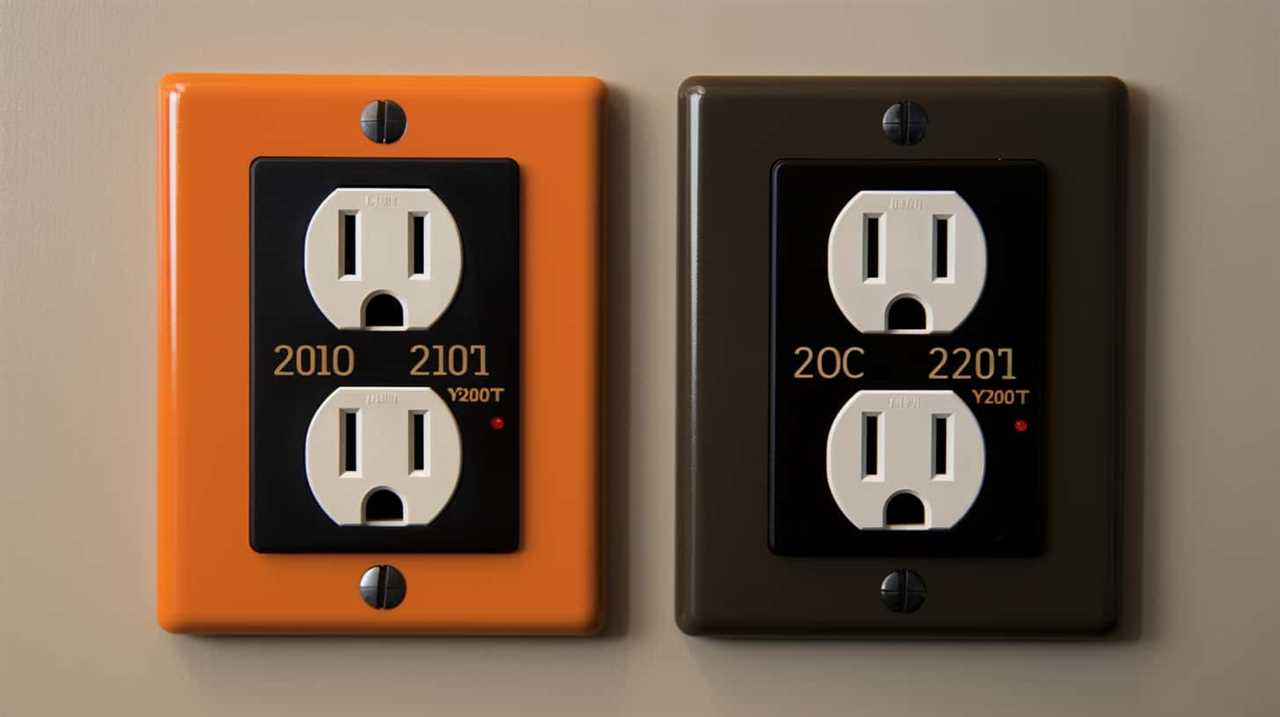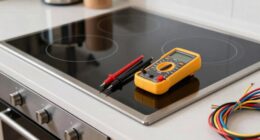In the world of household appliances, it is important to know the different options available, especially when it comes to fuel sources. Gas-powered appliances provide unique benefits, including efficiency and affordability, which make them a popular choice for homeowners looking to excel in their domestic tasks.
This comprehensive guide aims to shed light on the appliances that can be fueled by gas, empowering individuals to make informed decisions regarding their home setups. From stoves and ovens to water heaters, dryers, furnaces, fireplaces, space heaters, outdoor cookers, generators, and pool heaters, this compilation covers an array of essential household devices.
By delving into the specifics of each appliance, this guide aims to equip readers with the knowledge necessary to optimize their home’s energy consumption and efficiency.
Key Takeaways
- Gas appliances in the home include stoves and ovens, water heaters, dryers, and furnaces.
- Furnace maintenance is important for optimal performance, and alternative heating options such as electric, propane and oil, and wood and pellet furnaces are available.
- Gas fireplaces offer benefits over electric fireplaces, but safety considerations should be taken into account.
- Other gas appliances include gas grills, boilers, and space heaters.
Stoves and Ovens
Stoves and ovens, which are commonly found in residential kitchens, are typically powered by natural gas or propane. To ensure the optimal performance and longevity of your gas stove, regular maintenance is essential.

- Start by checking the burners for any blockages or debris, and clean them using a soft brush or cloth.
- Additionally, inspect the gas lines for leaks and make sure they are properly connected.
- For gas oven cooking tips, consider preheating the oven for the recommended time to ensure even cooking.
- It is also advisable to use oven-safe cookware and avoid overcrowding the oven to allow for proper air circulation.
- Lastly, regularly clean the oven’s interior to prevent the buildup of grease and food residue, which can affect its performance.
Water Heaters
Water heaters, another common household appliance typically found in residential settings, are also powered by natural gas or propane. Gas water heaters are a popular choice due to their efficiency and ability to quickly heat water.
When it comes to gas water heater installation, it is important to follow proper safety protocols and consult a professional if needed. One common issue with gas water heaters is a lack of hot water or insufficient heating. This could be caused by a faulty thermostat, a gas valve problem, or a buildup of sediment in the tank.
Troubleshooting gas water heaters involves checking for gas leaks, ensuring proper ventilation, and inspecting the pilot light. Regular maintenance and timely repairs are essential for ensuring the optimal performance and longevity of gas water heaters.
Dryers
Gas dryers are a common household appliance that utilizes natural gas or propane for efficient and effective drying of laundry. Here are four key features of gas dryers that make them a popular choice for many homeowners:

- Faster Drying Time: Gas dryers typically have a faster drying time compared to electric dryers. This is due to the higher heat output provided by natural gas or propane.
- Lower Operating Costs: Gas dryers are generally more energy-efficient than electric dryers, resulting in lower operating costs over time. This can lead to significant savings on utility bills.
- Better Performance: Gas dryers often deliver better performance in terms of drying clothes evenly and reducing wrinkles. The higher heat output allows for more effective removal of moisture from the laundry.
- Environmentally Friendly: Gas dryers produce fewer greenhouse gas emissions compared to electric dryers, making them a more environmentally friendly option.
Transition: Now that we have discussed gas dryers, let’s move on to the next section about furnaces.
Furnaces
Gas furnaces offer several benefits for homeowners. These include energy efficiency, cost savings, and reliable heating performance. However, it’s important to note that there are alternative heating options available for those who prefer not to use gas.
Additionally, regular furnace maintenance is crucial to ensure optimal performance and longevity.
Gas Furnace Benefits
The efficiency of a gas furnace is one of its key advantages in providing reliable and cost-effective heating. Gas furnaces offer several benefits that make them a popular choice for homeowners. Here are four reasons why gas furnaces are a great option for heating your home:

- Energy Efficiency: Gas furnaces are highly efficient, converting most of the fuel they consume into heat. This leads to lower energy bills and reduced environmental impact compared to alternative heating options.
- Fast and Effective Heating: Gas furnaces provide quick and consistent heat, allowing you to warm up your home faster and maintain a comfortable temperature throughout the day.
- Long Lifespan: Gas furnaces are known for their durability and long lifespan. With proper maintenance, they can last for 15 to 20 years or even longer.
- Improved Air Quality: Gas furnaces usually come with built-in air filtration systems that help remove dust, allergens, and other pollutants from the air, ensuring a healthier indoor environment.
To maximize the benefits of your gas furnace, it is important to follow regular furnace maintenance tips, such as scheduling annual inspections, cleaning or replacing filters, and ensuring proper ventilation.
Alternative Heating Options
One option for heating your home, apart from gas furnaces, is to consider alternative heating options. These alternatives can provide you with a more environmentally-friendly and energy-efficient way to keep your home warm. Here are some alternative fuel options that you can consider:
| Fuel Type | Energy Efficiency |
|---|---|
| Electric | High |
| Propane | Moderate |
| Wood | Low |
| Pellets | Moderate |
| Oil | Moderate |
Electric furnaces are known for their high energy efficiency, while propane and oil furnaces offer moderate efficiency. Wood and pellet furnaces, on the other hand, tend to have lower energy efficiency. When choosing an alternative heating option, it’s important to consider not only the fuel type but also its energy efficiency rating. By selecting a more energy-efficient option, you can reduce your carbon footprint and save on energy costs. Now, let’s move on to the next section to learn some furnace maintenance tips.
Subsequent Section: ‘Furnace Maintenance Tips’
Furnace Maintenance Tips
To properly maintain your gas furnace, it is important to follow these helpful tips:

- Regularly clean or replace the furnace filter: A dirty filter can restrict airflow and decrease the efficiency of your furnace.
- Keep the area around the furnace clear: Make sure there are no obstructions around the furnace to allow for proper airflow and prevent overheating.
- Schedule annual maintenance: Hire a professional technician to inspect and service your furnace to ensure it is functioning properly and to catch any potential issues early on.
- Address common furnace problems promptly: If you notice any issues such as strange noises, inconsistent heating, or a sudden increase in energy bills, don’t ignore them. Call a professional to diagnose and fix the problem before it worsens.
Fireplaces
When it comes to fireplaces, homeowners have the option of choosing between gas and electric models.
Gas fireplaces offer several benefits, including higher heat output, increased energy efficiency, and the ability to operate during power outages.
However, it is important to consider safety considerations such as proper ventilation and regular maintenance to ensure the safe operation of gas fireplaces.
Gas Vs. Electric Fireplaces
Gas and electric fireplaces are two popular options for homeowners looking to add warmth and ambiance to their living spaces. When considering gas vs. electric heating options, it’s essential to weigh the pros and cons of gas fireplaces. Here are four key factors to consider:

- Heat output: Gas fireplaces typically provide more heat than electric fireplaces, making them a better choice for larger rooms or colder climates.
- Energy efficiency: Electric fireplaces are more energy-efficient since they convert all electricity into heat, while gas fireplaces may lose some heat through venting.
- Installation and maintenance: Gas fireplaces require professional installation and regular maintenance to ensure safety and proper functioning. Electric fireplaces are generally easier to install and maintain.
- Cost: Gas fireplaces tend to have higher upfront costs due to installation and gas line requirements, while electric fireplaces are more affordable and cost-effective in the long run.
Considering these factors, it becomes clear that gas fireplaces offer several benefits worth exploring.
Benefits of Gas Fireplaces
Gas fireplaces offer numerous advantages that make them a desirable choice for homeowners. Not only do they provide warmth and a cozy ambiance, but they also come with a range of safety features and easy installation options. Here are some key benefits of gas fireplaces:
| Advantages | Description |
|---|---|
| Convenience | Gas fireplaces can be easily controlled with a thermostat or remote, allowing for instant heat without the hassle of chopping wood or cleaning up ashes. |
| Efficiency | Gas fireplaces provide efficient heating, with most models boasting high energy efficiency ratings. They also produce less environmental pollution compared to wood-burning fireplaces. |
| Safety | Gas fireplaces eliminate the need for open flames, reducing the risk of accidental fires. They also have built-in safety features such as auto shut-off valves and sealed combustion systems. |
| Installation | Gas fireplaces can be installed in a variety of locations, including existing fireplaces or in new construction. Professional installation is recommended to ensure proper venting and safety compliance. |
| Versatility | Gas fireplaces come in a range of designs and styles, allowing homeowners to choose a model that complements their decor and personal preferences. |
Safety Considerations for Gas Fireplaces
Safety is of paramount importance when it comes to the installation and operation of gas fireplaces. To ensure the safe use of gas fireplaces, it is crucial to follow proper installation and maintenance procedures.
Here are four important safety considerations for gas fireplace installation and maintenance:

- Professional installation: It is recommended to hire a licensed professional for the installation of gas fireplaces. They have the expertise to ensure proper venting, gas line connections, and overall safety.
- Ventilation: Adequate ventilation is essential to prevent the buildup of carbon monoxide. Regularly check and clean the vents to ensure proper airflow.
- Regular inspections: Schedule regular inspections by a professional to check for any gas leaks, damaged components, or blockages in the chimney or venting system.
- Maintenance: Follow the manufacturer’s guidelines for regular maintenance, including cleaning the glass, checking the burner, and replacing any worn-out parts.
Grills
When considering outdoor cooking options, one popular choice is utilizing grills fueled by gas. Gas grills offer several benefits that make them a preferred choice for many grilling enthusiasts.
One of the key advantages of gas grills is their ease of use. They can be quickly turned on and off, allowing for convenient and efficient cooking. Additionally, gas grills provide consistent heat, which ensures even cooking and prevents food from getting burned.
Another benefit is that gas grills are relatively low-maintenance compared to other types of grills. Regular gas grill maintenance involves cleaning the grates and burners, checking for gas leaks, and replacing worn-out parts.
With proper care, gas grills can last for many years, providing delicious grilled meals for outdoor gatherings.

Boilers
Boilers provide efficient heating for residential and commercial spaces. When it comes to gas boiler efficiency, there are several factors to consider. Here are four key points to keep in mind:
- Condensing boilers: These highly efficient boilers recover heat from exhaust gases, maximizing energy efficiency.
- Combi boilers: Combining a high-efficiency water heater and a central heating boiler, these units provide hot water on demand while saving space.
- System boilers: These boilers work with a separate hot water cylinder, making them a good choice for homes with multiple bathrooms.
- Regular boilers: Also known as traditional or conventional boilers, these are suitable for homes with more complex heating systems.
Understanding the types of boiler installations available can help homeowners and businesses make informed decisions about their heating needs.
Now, let’s move on to the next subtopic: space heaters.
Space Heaters
Gas space heaters provide efficient heating for residential and commercial spaces. These heaters utilize natural gas or propane as their primary fuel source, offering an alternative to electric space heaters. The use of gas as a fuel provides several advantages, including lower operating costs and increased energy efficiency.

Gas space heaters are capable of quickly heating a room or area, making them an ideal choice for colder climates or spaces with poor insulation. Additionally, gas heaters can be more environmentally friendly when compared to electric options, as natural gas is a cleaner burning fuel. With advancements in technology, gas space heaters now offer improved safety features and better control over temperature settings.
Transitioning to the next section, outdoor cookers also benefit from the use of gas fuel.
Outdoor Cookers
Outdoor cookers provide a convenient and efficient way to prepare meals using the same gas fuel as gas space heaters. Whether you’re grilling, frying, or boiling, outdoor cookers offer a versatile cooking experience.
Here are four essential points to consider when using outdoor cookers:

- Alternative Fuel Options: While gas is the most common fuel for outdoor cookers, it’s important to note that there are alternative fuel options available, such as propane and natural gas. Consider the availability and cost of these fuels before making your choice.
- Safety First: Outdoor cooking comes with its own set of safety considerations. Ensure proper ventilation when using gas cookers, as carbon monoxide can be a potential hazard. Keep flammable materials away from the cooking area and always have a fire extinguisher nearby.
- Keep It Clean: Regularly clean your outdoor cooker to prevent grease buildup, which can lead to flare-ups and potential accidents. Remove any food debris and grease from the cooking grates and burners.
- Practice Proper Food Handling: Follow safe food handling practices to prevent foodborne illnesses. Keep raw and cooked foods separate, cook meats to the appropriate internal temperature, and wash your hands thoroughly before and after handling food.
Generators
Generators are an essential appliance for providing backup power during emergencies or when electricity is not available.
Gas-powered home backup generators offer a reliable and convenient solution, as they can be connected directly to a home’s natural gas or propane supply.
Portable gas generators, on the other hand, are versatile and can be used for various purposes, such as camping or powering tools at a remote location.
The benefits of gas generators include their efficiency, long runtimes, and ability to provide continuous power.

Gas-Powered Home Backup
A reliable solution for backup power during emergencies is provided by gas-powered generators for homes. These generators, fueled by natural gas, offer several benefits that make them an attractive option for homeowners seeking a dependable power backup system.
Here are four key advantages of gas-powered home backup generators:
- Continuous power supply: Gas-powered generators can provide a continuous supply of electricity for an extended period, ensuring that essential appliances and systems in your home remain functional during a power outage.
- Cost-effective operation: Natural gas, which fuels these generators, is generally more affordable than gasoline or diesel. This makes gas-powered generators a cost-effective choice in the long run.
- Reduced emissions: Compared to gas-powered vehicles, gas-powered home backup generators produce lower emissions, making them a more environmentally friendly option.
- Convenience: Gas-powered generators can be connected directly to your home’s natural gas supply, eliminating the need for refueling or storing additional fuel.
With gas-powered home backup generators offering these benefits, it is essential to explore the options available, including portable gas generators, which will be discussed in the next section.
Portable Gas Generators
Gas-powered home backup generators provide a reliable solution for backup power during emergencies, and now it is time to delve into the topic of portable gas generators. Portable gas generators are versatile and convenient power sources that can be used in various outdoor settings, from camping trips to construction sites. These generators typically run on gasoline or propane and are designed to provide temporary electricity when access to the grid is limited or unavailable. They come in different sizes and power capacities, allowing users to choose the right generator for their specific needs.

Here is a table highlighting some key features and specifications of portable gas generators:
| Generator Model | Power Capacity | Fuel Type |
|---|---|---|
| GenPower 3050 | 3,500 watts | Gasoline |
| Champion 3800 | 4,750 watts | Gasoline |
| WEN 56200i | 2,000 watts | Propane |
In addition to providing power during outdoor activities, portable gas generators can also be used as a backup power source for home appliances, such as refrigerators, lights, and outdoor cookers. Their portability and ease of use make them a valuable tool for anyone in need of reliable power on the go.
Benefits of Gas?
What are the advantages of using gas as a fuel for portable generators?
Gas-powered generators have several benefits that make them a popular choice for both residential and commercial use:

- Efficiency: Gas generators are known for their high energy conversion efficiency, meaning they can produce more electricity with less fuel consumption compared to other types of generators.
- Availability: Gas is widely available and easily accessible, making it a convenient fuel source for portable generators. It can be easily obtained from gas stations or stored in portable containers for emergencies.
- Cost-effectiveness: Gas is generally cheaper than other fuel options, such as diesel or propane. This makes gas-powered generators a cost-effective choice for powering essential appliances during power outages or in remote areas.
- Environmental impact: While gas is a fossil fuel, it is considered a cleaner alternative compared to coal or oil. Gas generators produce lower emissions, contributing less to air pollution and reducing their environmental impact.
Pool Heaters
Pool heaters are commonly fueled by natural gas, allowing for efficient and reliable heating of the water. Gas pool heaters offer several benefits over other types of heaters, making them a popular choice for homeowners.
One of the main advantages of gas pool heaters is their fast heating capability. Gas heaters can quickly raise the water temperature, allowing you to enjoy your pool even on cooler days. Additionally, gas heaters are known for their high efficiency, which means they can effectively heat the pool while consuming less energy.
To better understand the benefits of gas pool heaters, let’s take a look at the following table:
| Benefit | Description |
|---|---|
| Quick Heating | Gas heaters can rapidly increase water temperature. |
| High Efficiency | Gas heaters provide effective heating with less energy consumption. |
| Reliable Performance | Gas heaters are known for their reliable performance and durability. |
| Versatility | Gas heaters can be used with both above-ground and in-ground pools. |
Frequently Asked Questions
Can Gas Appliances Be Converted to Electric?
Yes, gas appliances can be converted to electric. Converting gas appliances to electric offers several benefits, such as increased efficiency, lower operating costs, and reduced environmental impact. However, the conversion process may vary depending on the specific appliance.

Are Gas Appliances More Energy-Efficient Than Electric Appliances?
Gas appliances are generally more energy-efficient than electric appliances, resulting in lower energy consumption and cost savings. This is due to the direct heat source provided by natural gas, which allows for more efficient and precise cooking and heating processes.
Can I Use Natural Gas Appliances With Propane?
Yes, it is possible to use natural gas appliances with propane by converting them. However, it is important to consult with a professional to ensure safety and proper installation when using propane for heating or converting electric appliances to gas.
Is It Safe to Use Gas Appliances Indoors?
Using gas appliances indoors can be safe if proper ventilation is in place. However, it is important to consider the cost effectiveness of switching to electric appliances and the impact of gas appliances on indoor air quality.
What Are the Main Advantages of Using Gas Appliances Over Electric Ones?
The main advantages of using gas appliances for cooking include precise temperature control, instant heat, and lower operating costs. Gas appliances for heating offer efficient and consistent warmth, faster heating times, and the ability to operate during power outages.

Conclusion
Gas appliances provide a convenient and efficient way to meet our daily needs. From stoves and ovens to water heaters and dryers, these appliances offer reliability and cost-effectiveness.
Additionally, gas furnaces, fireplaces, and space heaters ensure warmth during chilly days. Outdoor cookers and generators add versatility to our outdoor activities, while pool heaters keep our swimming experiences enjoyable.
Embracing the gas-powered world may ignite a spark of sophistication and efficiency in our lives.









